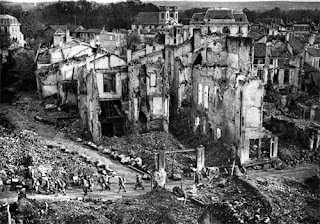21 FEBRUARY:The Battle of Verdun in 1916 was the longest single clash of World War One
The Battle of Verdun in 1916 was the longest single clash of World War One.
The setbacks from Verdun and the effect the fight had on the French Army was an essential purpose behind the British beginning the Battle of the Somme in July 1916 with an end goal to take German weight off of the French at Verdun. The Battle of Verdun began on February 21st 1916 and finished on December sixteenth in 1916. It was to make General Philippe Pétain a saint in France.
The assault on Verdun (the Germans code-named it 'Judgment') happened on account of an arrangement by the German Chief of General Staff, von Falkenhayn. He needed to "drain France white" by dispatching a huge German assault on a restricted stretch of area that had notable slant for the French – Verdun. The region around Verdun contained twenty noteworthy posts and forty littler ones that had generally ensured the eastern outskirt of France and had been modernized in the early years of the Twentieth Century.
Falkenhayn trusted that the French essentially couldn't permit these strongholds to fall as the national mortification would have been excessively. By battling to the last man, Falkenhayn trusted that the French would lose such a variety of men that the fight would change the course of the war
"The string in France has achieved limit. A mass achievement – which regardless is past our methods – is superfluous. Inside of our compass there are goals for the maintenance of which the French General Staff would be constrained to toss in each man they have. On the off chance that they do as such the powers of France will seep to death."Falkenhayn to Kaiser William II
Falkenhayn's arrangement had validity. The strongholds were all that much part of the French mind and they would battle brutally to keep the Germans out of the territory. In any case, Falkenhayn's arrangement likewise had one noteworthy shortcoming – it accepted that the French would be a simple rival and that it would be the French who might take enormous losses – and not the Germans. Actually, every one of the fortresses around the range had been debilitated as the French High Command had moved ammo out of the strongholds to different zones on the Western Front. Likewise the trenches burrowed for safeguard had not been finished. Senior officers at the stronghold complex around Verdun griped to Joffre about the condition of the protections in the territory. He dismisses their grumblings.
140,000 German troops began the assault. They were upheld by 1,200 cannons weapons that focused on 2,500,000 shells at the Verdun district. 1,300 ammo trains were expected to supply these firearms. The Germans additionally had complete air amazingness with 168 planes situated in the region – the biggest centralization of planes in history up to that point. To begin with, the French just had 30,000 troops to contradict the Germans. On the day the fight began, February 21st, 1000 German big guns firearms shot on a six mile line along the French front. One French fighter expounded on the ordnance assault:
"Men were squashed. Cut in two or separated start to finish. Blown into showers; paunches turned back to front; skulls constrained into the mid-section as though by a blow from a club."
The German assault and the resulting fight was to last more than 300 days. Fire hurlers were utilized as a part of substantial numbers surprisingly to offer the Germans propel the eight miles they some assistance with needing to if they somehow managed to catch Verdun. By February 25th, the Germans had caught 10,000 French detainees. To the German's surprise, the enormous post at Douaumont, thought to be the most effective fortress on the planet, was kept an eye on by only 56 elderly low maintenance heavy armament specialists who gave the German aggressors no resistance. The French open was not instantly told about Douaumont falling – indeed, some Parisian daily papers did not convey any anecdote about its misfortune guaranteeing that the fight around Verdun was going admirably for the French. The fortress at Douaumont was just five miles from Verdun itself.
The French put General Philippe Pétain accountable for the safeguard of Verdun. He was confronted with a to a great degree troublesome circumstance. There was one and only street into Verdun all things considered. Truth be told, it was scarcely a street by definition. It was just twenty feet wide and vehicles could scarcely pass each other. Yet along this street, 25,000 tons of supplies were moved into Verdun and 90,000 troopers. 6,000 vehicles were utilized as a part of this assignment and it is said that 66% of the French armed force was to leave behind this street sooner or later amid the fight to spare Verdun. The street was given the handle "Sacrosanct Way" by the French. Be that as it may, in spite of the new military info, the French endured severely. Two French fighters composed:
"You eat close to the dead; you drink next to the dead, you mitigate yourself adjacent to the dead and you rest alongside the dead.""People will read that the forefront was Hell. By what means can individuals start to recognize what that single word – Hell – implies."
The Germans likewise endured tremendous misfortunes. Before the end of April, the Germans had lost 120,000 men and the French 133,000 men. Indeed, even Pétain was moved to say in regards to French warriors battling in the fight:
"When they left the fight, what a forlorn sight they were. Their looks appeared to be solidified by a shrewdness of fear; they listed underneath the heaviness of frightening recollections."
As the fight traveled through the Spring of 1916, Pétain approached Joffre for more men however Joffre cannot. He needed the men for the arranged assault on the Somme. Pétain was supplanted by General Nivelle – an officer who trusted that the best system was to be in all out attack mode at all times. By the mid year, France had accomplished some type of air matchless quality over the Germans however this considered in vain the fight on the ground was one of straightforward steady loss as the setbacks mounted on both sides.
"Damnation can't be so appalling as this. Humankind is distraught; it must be frantic to do what it is doing." "A corridor of French blood was spilt on February 21st and it streams relentlessly in substantial spurts."
"I saw a man drinking energetically from a green filth secured bog, where lay, his dark face descending in the water, a dead man lying on his stomach and swollen as though he had not quit filling himself with water for a considerable length of time."
"To bite the dust from a slug is by all accounts nothing; parts of our being stay in place; yet to be eviscerated, destroyed, decreased to mash, this is the trepidation that substance can't backing and which is generally the colossal enduring of the assault."
Mysterious French fighters
Only 150 miles away, life in the French capital went ahead as 'would be expected'. Here, those French officers sufficiently fortunate to get leave from Verdun found an outsider world. Sustenance was copious and the one day in the week that was intended to be without meat was not kept by the greater part. Theaters were open and few – because of an administration clampdown on reality – spoke purposely about what was truly going on only 150 miles away. French troopers discovered their pay did not go far in Paris. A French assembly line laborer earned sixty times the pay of a French officer throughout a week. The thunderings of discontent in the French armed force could be heard in the mid year of 1916 – in 1917 it was to revolt.
On June first, Germany dispatched a huge assault at Verdun. By June 23rd, they got inside 2.5 miles from Verdun itself – yet this assault wavered as the German armed force itself had given all that it had and it could give no more. On June 24th, the barrage on the Somme could be heard at Verdun and with days, the fight at the Somme was to command military organizers on the Western Front. Before the end of October 1916, the French had re-caught the two posts at Vaux and Douaumont yet the encompassing area where the fight had been battled since February was a no man's land. The fight at Verdun proceeded to December – incidentally after the Somme strife was considered to have finished.
The death toll and those injured was enormous at Verdun. Reference books every now and again give contrasting figures such was the greatness of misfortune. It is plausible that an exact figure will never be known. It is said that the French lost more than 360,000 and the Germans almost 340,000. To calm the weight being felt by the French, the British propelled the Battle of the Somme in July 1916. It was trusted that a quick British triumph here would drive the Germans to expel troops from the Verdun range. In any case, similar to the French, the British got included in a fight that was to a months ago instead of days.





Comments
Post a Comment